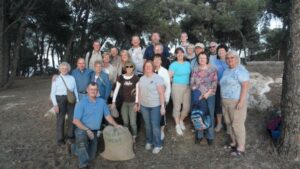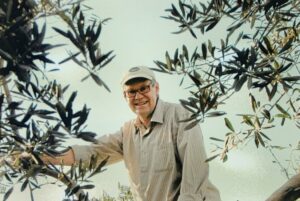Rev. Dr. Rolf Svanoe – Good Shepherd Lutheran Church – Decorah, Iowa
Acts 1
I love the Dr. Seuss book Oh, The Places You’ll Go. It’s often shared with graduates this time of year as they begin a new chapter of their lives. “You’re off to great places. Today is your day. Your mountain is waiting. So … get on your way.” Great places can include college or a new career. It might include marriage and a new home. It could also mean that you are ready to travel and explore the world. Oh, the places you’ll go!
Do you love to travel? I was bitten by the travel bug when I was in college. It was all Doc’s fault! That’s what we students affectionately called our college music professor. Doc had just returned from a sabbatical year in Germany and was eager to share that international experience with the Brass Choir, a music group he directed. So, in June of 1977, we spent three won- derful weeks traveling around East and West Germany (it was still divided then) and England. That first experience of travel opened my eyes to a whole new world. I had never traveled to a foreign country before, never been to a place where they spoke a foreign language, never ventured far outside my comfort zone. Believe me, crossing into East Germany at Checkpoint Charlie was way outside my comfort zone. But it was precisely there in East Germany that we had some of our most meaningful experiences. We had several encounters on that trip where we got to know local people and experience their hospitality. That human-to-human contact made a huge impression on me as I compared my experience in Germany to my life back home. Travel opened up new learning for me, new insights into other cultures, and new insights into myself.
During the recent pandemic, the travel industry was particularly hard hit. One of the popular travel shows on Public Television is Rick Steves’ Europe. When travel was shut down and people were stuck at home, Rick produced a show called Why We Travel.
“I’ve been reflecting on why I love to travel. Traveling is leaving home, leaving the familiar behind. Why do we do this? Well, to experience new things, to simply have fun, to be amazed, to learn, to become students of the world. And for some, like pilgrims, to search for meaning … Travel is more than a holiday. It gives us new experiences, acts as our greatest teacher, makes our life more meaningful and connects us with a global family. We can’t all travel physically, but anyone can live with a traveler’s mindset. It’s a choice. Travel makes us more comfortable with the world, our hearts bigger and our lives richer. And it makes us happier. And that is why we travel.”
Rick is a Lutheran who often talks of travel as a political and spiritual act that can significantly connect us to God, to others and to God’s beautiful creation.
Travel is something Jesus mentioned to his disciples before he left them. He gave them travel instructions. “But you will receive power when the Holy Spirit has come upon you; and you will be my witnesses in Jerusalem, in all Judea and Samaria, and to the ends of the earth.” Jerusalem, Judea/Samaria, ends of the earth – this verse provides a sort of roadmap for the book of Acts as the growing church spread from Jerusalem throughout the Roman Empire. The book describes the missionary travels of Paul, journeys that profoundly shaped him and in fact, changed the whole church.
The book of Acts is often called the Acts of the Apostles. Most scholars today think that it should really be called the Acts of the Holy Spirit. The Spirit is the major actor in the story, and the apostles are the ones who respond to what the Spirit is doing. The Spirit gives the power to witness. The Spirit overcomes barriers of language. The Spirit convicts and changes hearts and creates a radical new community. The Spirit heals the broken. The Spirit pushes the church to cross all kinds of cultural barriers of nationality, language, age, race, gender and economic status. The Spirit acted in new ways that the church often struggled to keep up with.
The Spirit is still doing the same today. Throughout this sermon series on the book of Acts, the Holy Spirit will be our tour guide leading us to all kinds of new places. Oh, the places you will go when the Holy Spirit is leading. But fair warning: When the Holy Spirit is leading, there may be places you are led outside your comfort zone, places that make you rethink your understanding of the world and your place in it, and places that make you rethink your under- standing of God. That’s exactly what happened in the book of Acts.
Jesus said, “You will receive power when the Holy Spirit has come upon you; and you will be my witnesses … to the ends of the earth.” The question is not whether we will be wit- nesses. We are witnesses by virtue of our baptism. The question is what kind of witness will we be? The fruit of the Spirit is love, and when we act in loving service to our neighbor we are wit- nesses to the Good News of the love of God in Christ. When Jesus ascended, the two men in white robes announced to the disciples that Christ would come again. Christ indeed comes again every time we love and serve our neighbor. Christ descends with healing and forgiveness. Christ gives us the power of the Holy Spirit so that we might witness to the Good News of God’s love.
Let me give you an example of that – another travel story. In the Fall of 2011, I led a tour to Israel. It was one of those trips that can change your life. For years I had read and studied the Bible. Now I had the privilege to visit those places I had read about. When I returned home, those places appeared again in my mind every time I read the Bible. Travel changed me and how I read Scripture.
Toward the end of our tour, we spent a few days in Jerusalem. We visited several holy sites including the Church of the Ascension on the Mount of Olives, the place some claim Jesus ascended into heaven. Israel was packed with tourists, and we stood in line for an hour waiting to get into the building to see a slab of rock containing Jesus’ last footprint. As we stared at the rock, I could tell that many of us were skeptics. Was it really a footprint we saw? Was this really the place of Jesus’ ascension? Or was it just a place based on old traditions that was used today to lure pilgrims to spend their tourist dollars? I must confess, we left that place being unimpressed. We had come to Israel hoping to experience God and deepen our faith. But for many of us, God wasn’t there in that rock.
While we were on the Mount of Olives, I had made arrangements for our group to visit the Augusta Victoria Hospital, a program of the Lutheran World Federation. The complex was finish- ed in 1914 by the German Empress Augusta Victoria as a retreat for the Germans visiting the Holy Land. The hospital began after the 1948 war to provide medical care for Palestinian refugees. The Lutheran World Federation representative there at the time was a Seminary classmate of mine who gave us a tour of the facility and talked about its mission. He also gave us insight into what life was like for the Palestinians because of the separation wall. For many in our group, this was the most meaningful experience of the whole trip. We weren’t just visiting ancient places; we were seeing the church involved in the current struggle for healing and justice.
The Augusta Victoria Hospital on the Mount of Olives is surrounded by 800 olive trees. Every October to November volunteers harvest the olives, which are then processed into olive oil. Proceeds from the sale of the olive oil help to cover the hospital operating costs and provide medical care for those who cannot afford to pay. I had told our group about the harvest, and they were eager to help. Instead of traditional tourist activities we spent our free afternoon in Jerusalem climbing ancient olive trees and raking the olives off the branches to the waiting tarps below. From the treetops you could pause and look out across the Kidron Valley to Old Jerusalem and the Dome on the Rock, a most impressive view. One of our best climbers was an 80-year-old man who said he felt like a kid again! Oh, the places you will go to share the love of Christ! That day our group estimates it harvested 300 pounds of olives. Dirty and sweaty after our work, we paused for a group picture at a place called Ascension Rock. Locals claim that this is the true place where Jesus ascended into heaven. No one knows for sure. But what our group experienced that day on the Mount of Olives was not Jesus’ Ascension, but Jesus coming again to be with us in those olive branches. We had stopped being tourists and had become witnesses to the love of God in Christ. In that act of service, we encountered the risen Christ. We were dirty and tired and we were filled with the Holy Spirit. We experienced the promise, “You will receive power when the Holy Spirit has come upon you, and you will be my witnesses.”
Have you ever noticed that it feels good to give? In the act of serving others, God comes down and we receive a blessing. Perhaps some of you are Thrivent members. If you’ve ever applied for Thrivent grants to support a service project, you also receive a T Shirt to wear that says on it, “Live Generously.” Living generously is a lifestyle choice we make to give and serve others. But it is in that very act of giving that Christ comes again and we receive a blessing. “You shall receive power when the Holy Spirit has come upon you, and you shall be my witnesses…” We witness through our loving words and actions.
“Oh, the places you will go!” Those words written by Dr. Seuss are even more true when you are led by the Spirit. Throughout this summer series on the book of Acts we are going to go to some strange places. Some might push us outside our comfort zone. One thing for sure, traveling with the Spirit will change your life forever.
Celebrating our olive harvest at the Augusta Victoria Hospital Ascension Rock
Rev. Svanoe high up in an olive tree.





